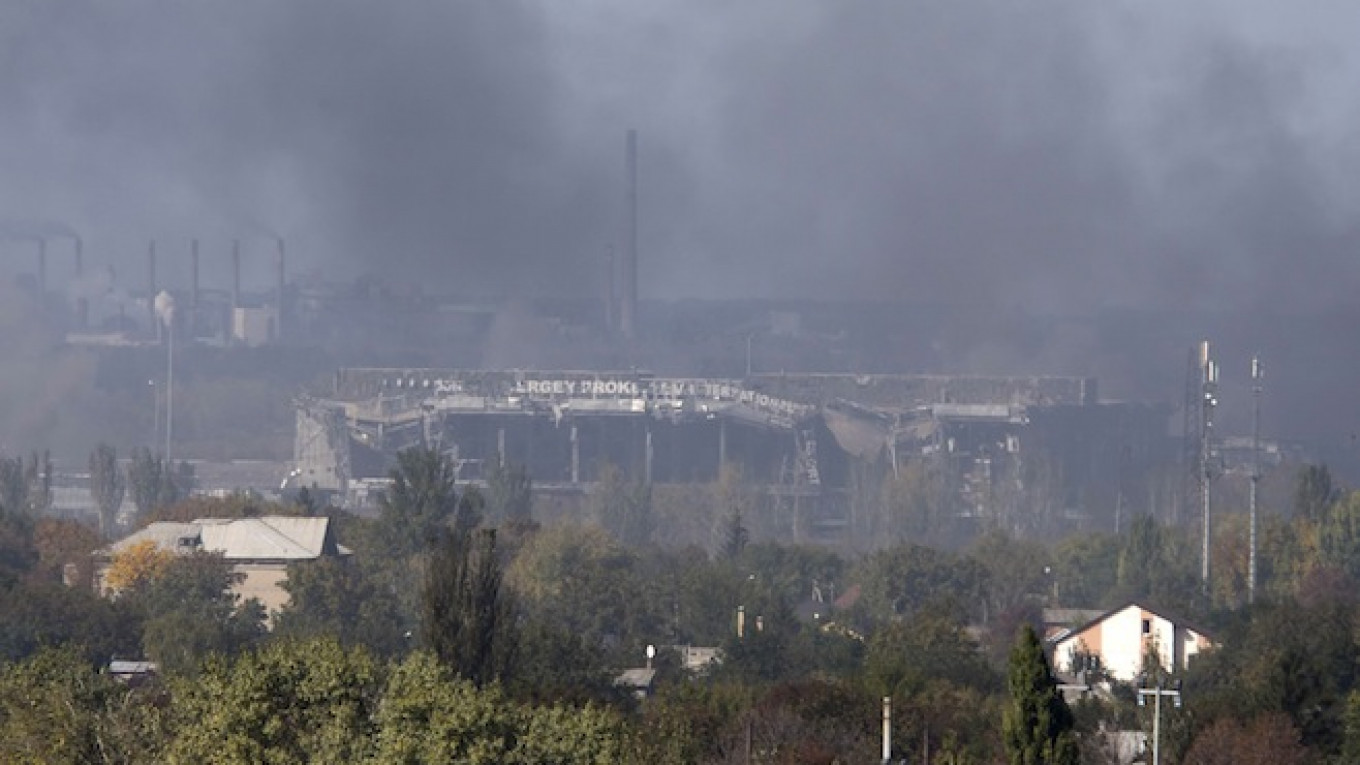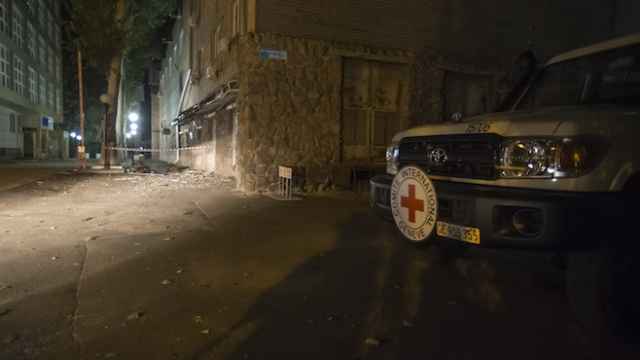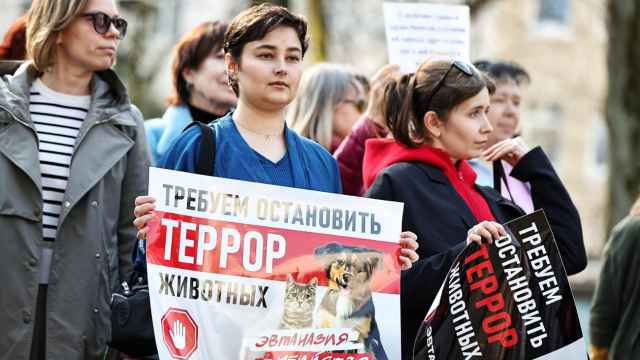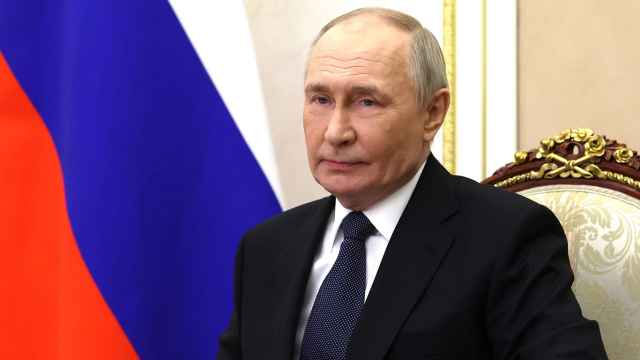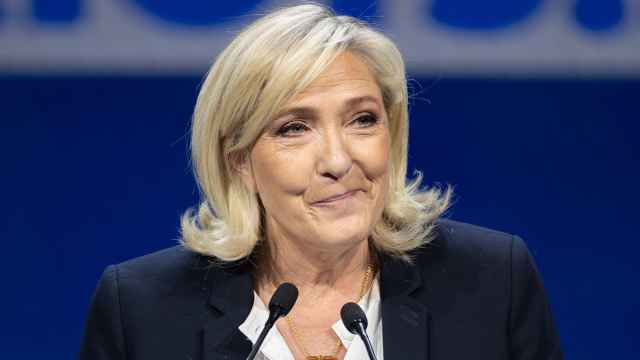KIEV — Ukraine accused Russian forces on Friday of helping separatists to step up pressure on government troops holding the main airport in the eastern city of Donetsk, threatening a fragile cease-fire.
Military spokesman Andriy Lysenko said Ukrainian forces had repelled several separatist attacks on the airport in the past 24 hours but "nonstop fighting" continued and "significant numbers of armor, heavy artillery and troops" had moved into the area.
"The Russians have sent in a full unit of drones over the airport, directed by Russian specialists, in order to carry out air reconnaissance and to direct fire," he told journalists.
Mortar and artillery fire has increased between separatists and government troops in rebel-controlled Donetsk, the east's main industrial hub, in recent days after a lull last week.
A Swiss Red Cross worker was killed on Thursday night by a mortar bomb that landed near the organization's office in the city.
Seven Ukrainian soldiers died in a single strike by tank fire on their armored personnel transporter on Monday and at least 10 people were killed when shelling hit a school playground in Donetsk and a public transit mini-van in a street nearby on Wednesday.
Each side has blamed the other in the attacks. Government forces say they are observing the cease-fire and returning fire only when they are fired on.
Ukrainian Foreign Minister Pavel Klimkin said separatists had been responsible for the death of Red Cross worker Laurent DuPasquier, but the Russian foreign ministry in a statement on Friday said the mortar bomb fire that killed him had come from territory controlled by Ukrainian forces.
Move Toward Mariupol
Two Ukrainian servicemen had been killed and nine others had been wounded in the past 24 hours, Lysenko said.
Lysenko said that government forces still had control of the airport, a strategic point with modernized runways able to take heavy transporter planes. Defenses had been strengthened.
Lysenko also said that in the south of Ukraine, on the coast of the Sea of Azov, Ukrainian intelligence had also reported that more Russian armor and a Russian reconnaissance unit had moved in near the town of Mariupol.
Mariupol, which is defended by Kiev government forces, is of strategic importance since its loss could help open up a route for Russian-backed forces to the Crimean peninsula, which was annexed by Russia in March.
Lysenko said though the cease-fire was almost a month old, the separatists were still not respecting the truce.
"Since the attacking side has not ceased fire, the Ukrainian side is not pulling back its arms and is continuing to defend its positions. But the Ukrainian army is not conducting attacking, offensive maneuvers," he said.
Ukrainian President Petro Poroshenko, who is hoping a strong mandate for his peace plan will emerge from a parliamentary election on Oct. 26, called the cease-fire on Sept. 5 after battlefield reverses which Kiev ascribed to Russian forces entering the fray. Moscow denies this.
Poroshenko appears to be seeking to try to calm the waters ahead of the election. But large-scale loss of life among Ukrainian forces could call into question his strategy and bolster opponents who call for a more militant line to be taken.
The latest UN estimate says that more than 3,500 people have died in the conflict — including Ukrainian forces, rebels and civilians — which erupted in the east after pro-Western leaders took power in Kiev following street protests that chased Moscow-backed president, Viktor Yanukovych, from power.
Ukrainian defense officials say many hundreds of Russian troops have also been killed, though Moscow denies the involvement of any of its troops in the conflict despite what Kiev and the West says is incontrovertible proof.
A Message from The Moscow Times:
Dear readers,
We are facing unprecedented challenges. Russia's Prosecutor General's Office has designated The Moscow Times as an "undesirable" organization, criminalizing our work and putting our staff at risk of prosecution. This follows our earlier unjust labeling as a "foreign agent."
These actions are direct attempts to silence independent journalism in Russia. The authorities claim our work "discredits the decisions of the Russian leadership." We see things differently: we strive to provide accurate, unbiased reporting on Russia.
We, the journalists of The Moscow Times, refuse to be silenced. But to continue our work, we need your help.
Your support, no matter how small, makes a world of difference. If you can, please support us monthly starting from just $2. It's quick to set up, and every contribution makes a significant impact.
By supporting The Moscow Times, you're defending open, independent journalism in the face of repression. Thank you for standing with us.
Remind me later.


